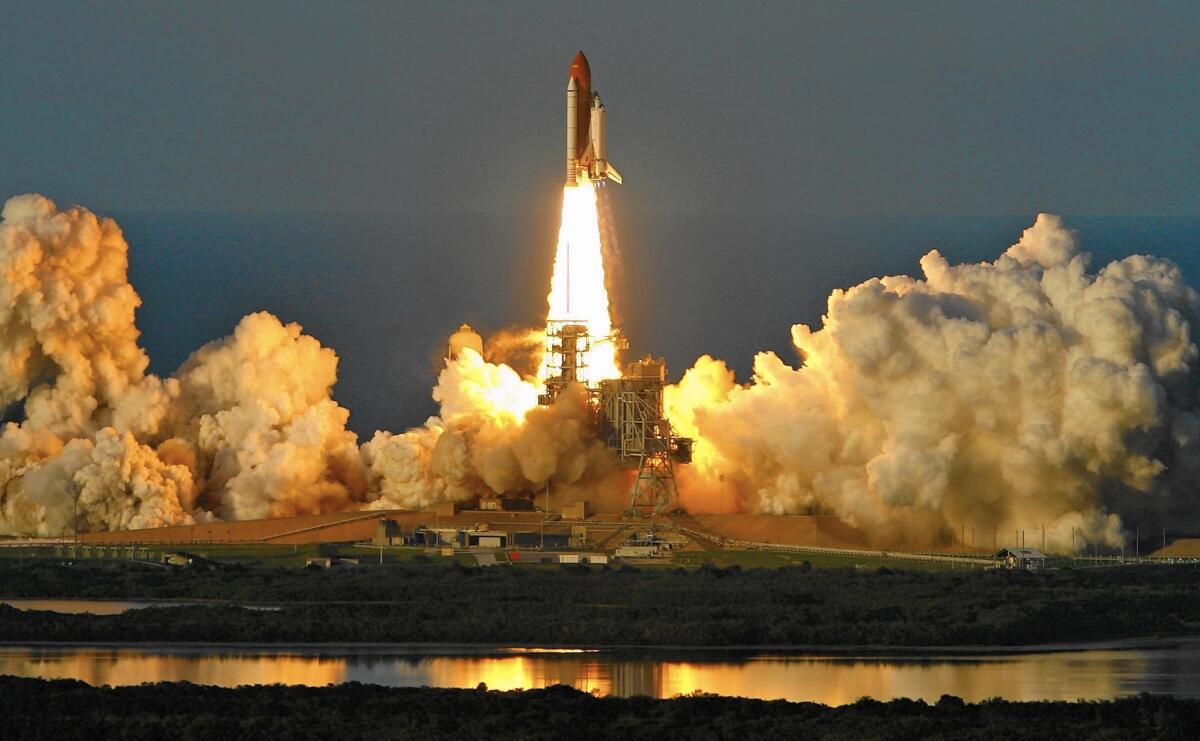Review: ‘Leaving Orbit’ cheers spaceflight’s feats, mourns its fading

- Share via
In 1969, the moon landing brought together a nation, millions slack-jawed in the glow of their televisions. In 1986, the explosion of the Challenger became a defining moment for a generation of schoolchildren. But how many of us remember the blastoff of Atlantis in 2011 — the final flight of NASA’s manned space shuttle program?
Margaret Lazarus Dean, an English professor at the University of Tennessee, remembers it vividly. In her new book “Leaving Orbit,” she traces the trajectory from the first event to the third — from electrifying ambition to widespread indifference. By the time Atlantis took off, few Americans even noticed that the program was ending.
Dean wrote a 2008 novel, “The Time It Takes to Fall,” centered on the Challenger, but after it was published, her interest in spaceflight grew more consuming. Pondering the end of the space shuttle program, she was gripped by a compulsion to attend the last three launches in Cape Canaveral, Fla. The story of the dawn of the Space Age had been told by some of the giants of narrative nonfiction: Tom Wolfe, Norman Mailer, Oriana Fallaci. Dean — betraying her own grand ambition — wanted to be the one to document its twilight.
“No one has yet tried to grapple with the end that is now in sight,” she writes. “Only when something ends can we understand what it has meant.”
The result is an exuberant, wistful account of the author’s repeated schleps from her home in Tennessee to swampy Florida, an account interspersed with the history of American spaceflight and quotes from its great chroniclers. As for what it has meant, Dean never quite arrives at a sweeping conclusion, but the book is peppered with insights that collectively provide a kind of impressionistic answer.
Consider, for example, this striking image from the launch of Endeavour: “the crowd lifts their voices, sounding a little incredulous, then a little frantic, as though it is their enthusiasm and nothing else keeping Endeavour on its straight path.” Often, Dean finds that our attitudes toward spaceflight embody feelings about other big themes: risk, the future, government. Noting the receptiveness of her students to moon-hoax conspiracy theories, she perceives in these youngsters “an assumption that a government agency can’t have accomplished something so awesome.”
Dean reminds us that spaceflight was a key element of the 1960s’ seemingly limitless optimism and novelty. She summons that time, known as the “heroic era” in space parlance, then ushers us to the more humdrum “shuttle era,” in which the vehicles remained within “Earth orbit.” The heroic era had been spurred by fear of Soviet supremacy, and when the Cold War receded, the ambitions of the program fell prey to competing concerns about funding and safety — especially after the explosion of the Challenger and the less-noticed disintegration of Columbia in 2003. Now, the future is uncertain; NASA still dreams of manned missions to Mars, but Dean is pessimistic that the money will materialize.
Writing about space tends to either glorify the taciturn daring of a few or muse on humanity’s insignificance in the context of the vast universe. Dean’s book, by contrast, celebrates human ingenuity and commitment but dwells less on the astronauts than on NASA’s thousands of anonymous employees who take pride in their minuscule but essential contributions to a majestic project. In fact, the main character, other than the author, is her friend Omar, an “orbiter integrity clerk” charged with guarding the vehicle Discovery. Dean’s only conversation with a shuttle-era astronaut is a phone interview with a woman who has never traveled to space. While this might represent in part a lapse in reporting, it comes across more as a choice to emphasize the less sexy, typically ignored members of an immense beehive-like operation.
Dean’s space obsession, one we tend to consider the province of 8-year-old boys, is an asset, enabling her to convey the emotional allure of the program. But at times her deep immersion in the subject makes the book feel slightly blinkered. She throws around jargon such as “demating” and “payload” without explanations. She expresses anger about the death of the program but advances no cogent case for devoting massive funding to extraterrestrial excursions rather than to pressing needs on this planet. (In one of her finer moments, she writes, “I feel the built-in pointlessness at the heart of Apollo as much as I fiercely admire it — it’s the same pointlessness shared by any artistic gesture.”) Nor does she explore the intriguing question of whether the aspects of space travel she finds most moving — the sense of purpose, the sheer scale of the accomplishment, the unifying effect — need involve space travel at all.
By invoking what might be called the heroic era of nonfiction — also known as new journalism — Dean at once bravely invites comparison to those masters and implicitly casts herself as a humbler, shuttle-era version of Mailer and Fallaci. At her best she is a worthy successor in their common undertaking. “We all feel Norman’s masculine envy at being left behind, but our envy is beside the point,” she writes. “We know that someone needs to stay behind and write about what it feels like to watch it from the ground.”
Tuhus-Dubrow is a contributing editor at Dissent.
Leaving Orbit
Notes from the Last Days of American Spaceflight
Margaret Lazarus Dean
Graywolf: 240 pp., $16 paper
More to Read
Sign up for our Book Club newsletter
Get the latest news, events and more from the Los Angeles Times Book Club, and help us get L.A. reading and talking.
You may occasionally receive promotional content from the Los Angeles Times.










